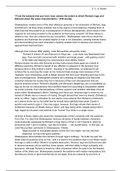S. V. H. Boyes
“From the extracts that you have read, assess the extent to which Richard, Iago and
Edmund share the same characteristics.” [750 words]
Shakespeare creates some of the best villainous personas in his characters of Richard, Iago
and Edmund. All three share ambition due to the nature of circumstances cheating them of
what they feel they deserve as a consequence of various discrepancies, which result in their
capacity for evil being unveiled to the audience by their being complicit. All three refuse to
adhere to law, thus are unbound by any convention - Shakespeare uses this to shock the
audience and illuminate the cruelest depths of man in his characters, creating intense drama
and demonstrating how each character’s duplicity enables them to deceive and scheme
against those that trust them.
Although their motives differ slightly, Juliet McLauchlan eloquently notes:
‘Richard III (Henry VI) and Edmund (in King Lear…) are more truly Machiavels than
Iago. They are both concerned with ambition and kingly power - with gaining control
of the state and keeping it by unscrupulous and ruthless means.’
Richard shares his aims with Edmund but they both pursue these goals as a result of
differing reasoning. Richard is bereft of any affection or pleasure in life because “love
forswore [him] in [his] mother’s womb”, resulting in his deformities, so believes he will
achieve this by securing the crown as his; Edmund feels wrongly done because of his
“bastardy” and comparative youth to Edgar prevent him from ever inheriting land due to the
laws of primogeniture. Shakespeare presents the underdog as indignant and filled with
contempt towards the society they live in because of their own discrepancies that are
beyond personal control. Richard’s disability and Edmund’s illegitimacy are not paralleled by
Iago as he has no characteristics that manifest inward evil according to Elizabethan beliefs.
As social outcasts, their internal jealousy of those superior and ambition ultimately drive all
action within Shakespeare’s Minor Tetralogy and King Lear, whereas Iago is driven by his
hatred of Othello due to rumours of it being “thought abroad that ’twixt my sheets, /[Othello’s]
done my office.” Iago’s motivation for evil seems more external than Richard or Edmund’s,
as it seems driven too by his belief that he should have rightfully been given Cassio’s
position and wants to gain it. One may argue, however, that Iago shares their sense of
entitlement because of Othello being a “Moor” and Iago being white, despite being held in
high regard by his peers and referred to as “honest” four times in a single scene.
All three of these villains also share the characteristic of their complicity with the audience.
From this, it is clear that Shakespeare removes all sense of loyalty between characters,
most profoundly expressed by Richard in King Henry VI Part 3, Act 5 Scene 6, when he
announces that “I am no brother, I am like no brother… I am myself alone.” In this way, as
Juliet McLauchlan comments in Shakespeare: Othello,
“[Iago’s] power to manipulate people comes from his insight, not only into their
weakness, but into their good qualities.”
Shakespeare demonstrates this intention through Iago’s soliloquy: “he holds me well; the
better shall my purpose work on him,” and it is clear to the audience that it is by these means
that Iago is able to effect Othello’s complete destruction. Richard, Iago and Edmund are able
to deceive because of how well they know people, with their ability to feign sympathy and
ignorance, although Richard is known by other characters within the play to be hot-headed,
neither of the others are. Shakespeare presents the audience with master manipulators that
feel that any divine or governmental law do not apply, thus are unbound by any form of





